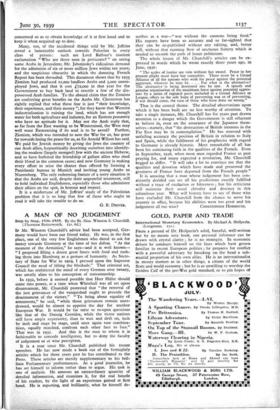A MAN OF NO JUDGEMENT
IF Mr. Winston Churchill's advice had been accepted, Ger- many would have been our friend today. He was, in the first place, one of the very few Englishmen who dared to ask for mercy towards Germany at the time of her defeat. " At the moment of the Armistice," he says—and it is well known- " I proposed filling a dozen great liners with food and rush- ing them into Hamburg as a gesture of humanity. As Secre- tary of State for War in 1919, I pressed upon the Supreme Council the need of lifting the blockade." That criminal act, which has embittered the mind of every German over twenty, was utterly alien to his conception of statesmanship.
In 1932, before it seemed possible that Herr Hitler should come into power, at a time when Whitehall was all set upon disarmament, Mr. Churchill protested that " the removal of the just grievances of the vanquished ought to precede the disarmament of the victors." " To bring about equality of armaments," he said, " while those grievances remain unre- dressed, would be almost to appoint the day for another European War. It would be far safer to re-open questions like that of the Danzig Corridor, while the victor nations still have ample superiority, than to wait and drift on, inch by inch and stage by stage, until once again vast combina- tions, equally matched, confront each other face to face." That was in 1932. And this is the man to whom it is fashionable to concede intelligence, but to deny the faculty of judgement or of wise perception. It is a year since Mr. Churchill published his recent speeches. He has now made a book out of the fortnightly articles which for three years past he has contributed to the Press. These articles arc merely supplementary to his bril- liant Parliamentary performances. As a good journalist, he has set himself to inform rather than to argue. His task is one of analysis. He amasses an extraordinary quantity of detailed information, and examines it, for the real benefit of his readers, by the light of an experience gained at first hand. He is reporting, and brilliantly, what he himself de-
scribes as a war—" war without the cannons being fired." His reports have been so accurate and so far-sighted that they can be re-published without any editing, and, better still, without that running flow of unctuous flattery which is needed to smooth the path of lesser politicians. The whole lesson of Mr. Churchill's articles can be ex- pressed in words which he wrote exactly three years ago, in June, 1936:
" The scales of justice are vain without her sword. Peace in her present plight must have her constables. There must be a Grand Alliance of all the nations who wish for peace against the potential aggressor, whoever he may be. . . . For what is the alternative? The alternative 'is being destroyed one by one. A speedy and genuine organisation of the maximum force against potential aggres- sors by a series of regional pacts included in a Grand Alliance or League, offers us the sole hope of preventing war or of preventing, if war should come, the ruin of those who have done no wrong."
That is the central theme. The detailed observations upon which it has been built are no less worthy of attention. To take a single instance, Mr. Churchill has for years past drawn attention to a danger which the Government is still reluctant to believe in, even on the assurance of the Japanese them- selves—namely, that " the destruction of British interests in the Far East may be in contemplation." He has assessed with unfailing accuracy the position of Britain in relation to Italy and Spain, while the fulfilment of his prophecies with regard to Germany is already historic. Most remarkable of all has been his continuing faith in the qualities of the French. Even in September, 1936, when most men regarded France as past praying for, and many expected a revolution, Mr. Churchill begged to differ. " It will take a lot to convince me that the qualities and devotion which have made and preserved the greatness of France have departed from the French people." It is amazing that a man whose judgement has been con- sistently derided can see all his predictions exactly fulfilled without a trace of exultation or bitterness ; but his criticisms still maintain their usual chivalry and decency in this calamitous year. What will history have to say of those who have excluded Mr. Churchill from the chance to serve his country in office, because his abilities were too great and his










































 Previous page
Previous page